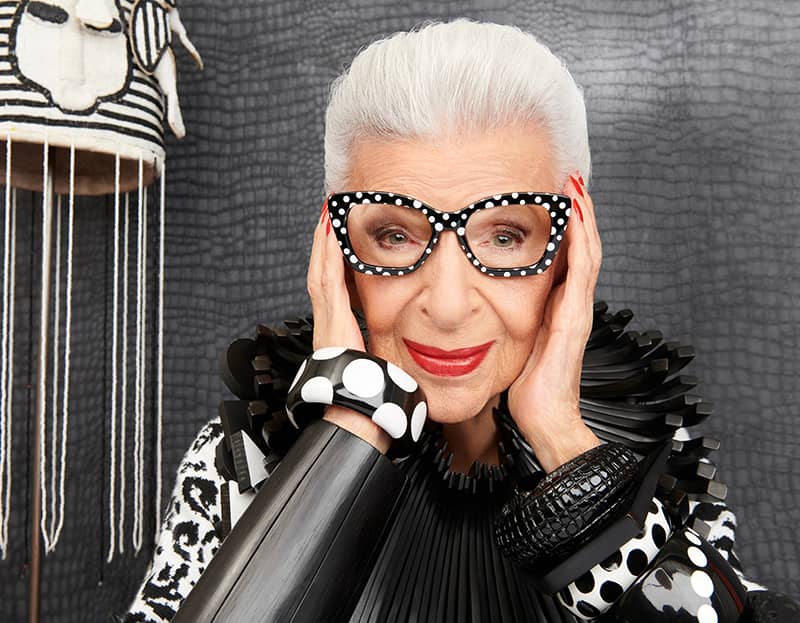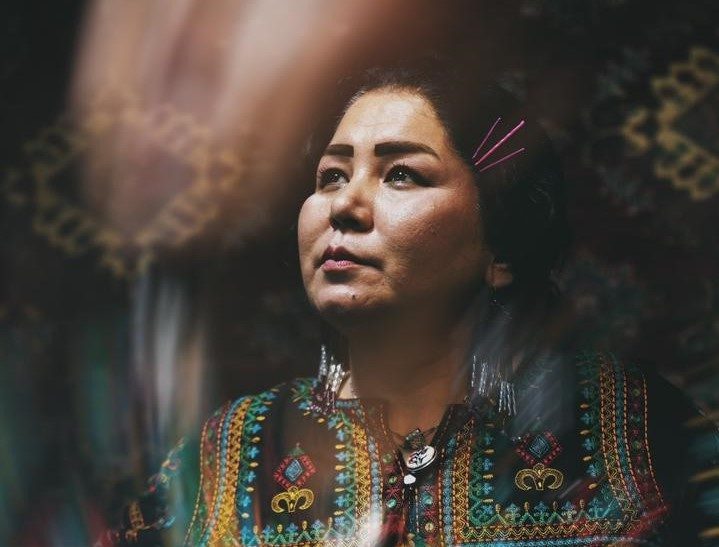We live in an age of infinite information. Any subject in anthropological record can be explored at the stroke of a key; there are computer programs that can emulate the human mind, and apps that can aid you in every area of your life.
Yet, an actual human still remains unique, inimitable.
With this logic then, an individual who lived for over a century – even if the existence is unremarkable, perhaps even banal – is a rare find. Rarer still is someone who exceeds such a milestone whilst living an unapologetically unusual life. It could, without any sensation, be said that such a person is nothing short of a prized jewel.
Iris Apfel was one of those extraordinary creatures. Born in Astoria, Queens, New York in 1921 she was a living, breathing memento of some of the most fascinating, tumultuous and tempestuous eras in human history.
Raised in a period of impressive industry, of which New York was the epicentre, Apfel was like a sword forged in these fires, and remained as robust, faithful and gleaming as the steel girders at the core of the Chrysler building.
Not surprisingly, Apfel’s own thoughts on the passing of time were as strident and straightforward as an M train hurtling into Queens Plaza: “Ageing ain’t for the faint-hearted, but what other option is there?” she said.
“I like to embrace every day and I don’t really think about my age, because it’s just something that happens. Mostly I feel lucky to still be here! But I do have the same work ethic I’ve always had and that’s the thing that has served me best over the years.”
With a CV spanning seven decades – her first position was as a copywriter for Women’s Wear Daily, earning US$15 a week – Apfel knew a thing or two about how to get ahead in life.
Rule number one? Follow your nose, not the money.
“People always look at me like I had some great plan of how this would all turn out, but that couldn’t be further from the truth,” she offered.
“If I had anticipated becoming a fashion icon, having my clothing and accessories featured in museums, gracing magazine covers; or wanted to be the face of a cosmetics brand, I certainly wouldn’t have expected it to happen when I was in my nineties! I always just listened to my gut and isn’t that the beauty of life, with all its unexpected twists and turns?
“What I will say though,” said the centenarian, “is that you’ve got to be prepared to get stuck in even when you’re at risk of the fear overwhelming you. Sure, it’s not going to be easy – easy is doing nothing. And exploring uncharted territory demands a tremendous amount of energy and resilience … but that’s the only way you’re going to have an interesting life.” While hard graft may be essential, there was still one thing that needed to be innate and for the indefatigable Apfel, that was her sense of style.
Despite being raised on a farm, the curious youngster regularly ventured into Manhattan on the subway where she fell in love with the idiosyncratic energy of New York, particularly Greenwich Village. It was on these intrepid first adventures that she would begin her lifelong habit of buying antique trinkets and pieces of jewellery. Little did she know at the time, it was to grow into a collection that would eventually be worthy of its own exhibition at the Costume Institute at The Metropolitan Museum of Art.
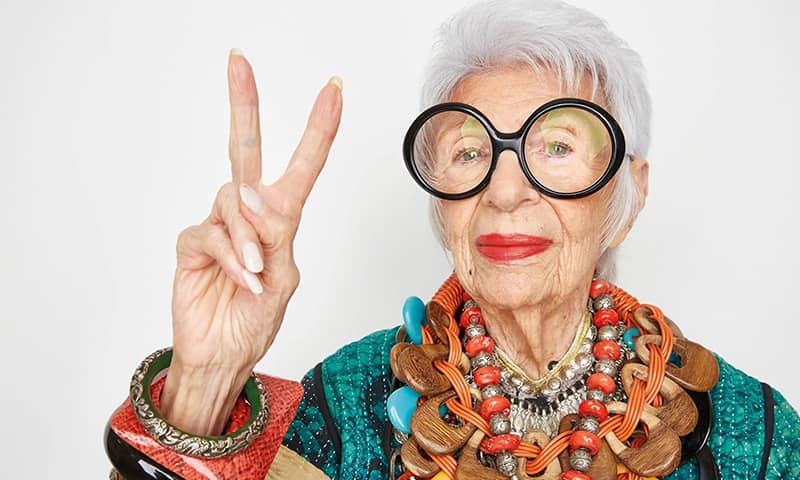
Rise of an icon
The only child of Samuel Barrel, whose family owned a glass and mirror business, and his Russian-born wife, Sadye ‘Syd’ Barrel, proprietor of a fashion boutique, Apfel went on to study Art History at New York University, and attended art school at the University of Wisconsin.
In 1948 she married Carl Apfel, and in 1950 the young couple founded international fabric manufacturing company, Old World Weavers. Channelling both the work ethic of the Jewish immigrant community in which she was raised and the rich cultural tapestry her beloved Manhattan comprised, Old World Weavers specialised in fabric reproductions and restorations from the 17th to 19th centuries. The couple would travel to Europe twice a year to source fabric unavailable in the States. In the ensuing decades the company was employed by nine White House administrations – running from Harry Truman to Bill Clinton – for various design projects at the seat of US politics, with Apfel herself earning the moniker ‘First Lady of Fabric’.
The pinnacle of professionalism, Apfel rarely indulged in gossip from the executive mansion, however she was happy to share wisdom gleaned from the experience. “Working under presidents taught me that style can be a force of diplomacy and, not surprisingly, most administrations usually only sought to emulate the style that was previously present. I mean, right down to the smallest details.”
One exception to this rule was Mrs Kennedy who enlisted a famous Parisian designer to transform The White House into a French chateau, a move which sent the collective design community into a frenzy. “After that we had to throw it all out and start again … same as it ever was!” she laughed.
The couple were hugely successful both personally and professionally, living a harmonious life full of joy, love and adventure. However, their busy schedules and need to travel frequently meant that children were out of the question. “Everyone expects you to have children and I don’t like to do what people expect me to,” said Apfel defiantly. “Besides, any children would have had to have been primarily raised by a nanny and I don’t agree with that. So, it was a decision that we made and stuck to. I mean, it’s not like our life together wasn’t full of fun and pleasure. That’s what I mean when I say I don’t worry about ageing, because I really think we all need to hold on to that curious, youthful spirit. It’s vital to our survival, particularly in this homogenised world.”
The Apfels collectively retired in 1992, and ordinarily this would have been the end of their working chapter. But Iris’s indomitable and restless spirit would eventually open a new chapter – one that was, arguably, even more thrilling than the previous.
It all began with a phone call in 2005 from Harold Koda at the Metropolitan Museum of Art’s Costume Institute. The curator was in a panic because a late summer exhibition had been cancelled and he was in urgent need of a new show. He had heard that Apfel had an incredible collection of vintage and designer clothes, accessories and costume jewellery, and implored her to personally pull together a showcase from her pieces. A meeker woman may have demurred, but instead Rara Avis: Selections from the Iris Apfel Collection was born.
Without a doubt, the show was a gamble. Not only was it the first exhibition in the history of The Met that had focused on a living female who wasn’t an actual designer; but secondly, it was styled by the muse herself, with the mannequins mirroring Apfel’s sartorial subversiveness. It could have been a total bust, and New York society are not a forgiving crowd, but all those years of collecting, curating and developing her unique style meant not only that visitors to the museum adored the exhibits; in addition, Apfel herself was ready to fully embody her role as a style icon. “I’ve lived through eras where fashion was more than just clothes,” she said, semi-wistfully.
“It was a statement, a voice, and in some cases, a revolution, but what makes me tick is finding pieces that I love. I don’t care about what others say is in fashion, I dance to the beat of my own drum.”
“Also,” she added, “I don’t take myself seriously. Ever!”
What ensued in the following 18 years had been nothing short of astonishing. Apfel had the kind of career in fashion that a hungry young graduate might only dream of, let alone someone a decade into retirement.
At the age of 92 she became the star of her very own documentary, Iris, directed by Albert Maysles. In 2018, she was awarded the highest honour in fashion: a Barbie doll in her image. And in 2019, aged 97, she signed a modelling contract with global agency IMG – on the encouragement of her pal, Tommy Hilfiger, who thought she would benefit from formal representation.
The Benjamin Button of the fashion world, Apfel did it all in reverse, but with impeccable style and grace. She certainly taught the young whippersnappers a thing or two, having fronted a campaign for Kate Spade, alongside the Victoria’s Secret model Karlie Kloss; and another for jewellery designer Alexis Bittar, which also featured of-the-moment blogger at the time, Tavi Gevinson. There have been countless other campaigns and collaborations, plus a biography with HarperCollins entitled Iris Apfel: Accidental Icon.
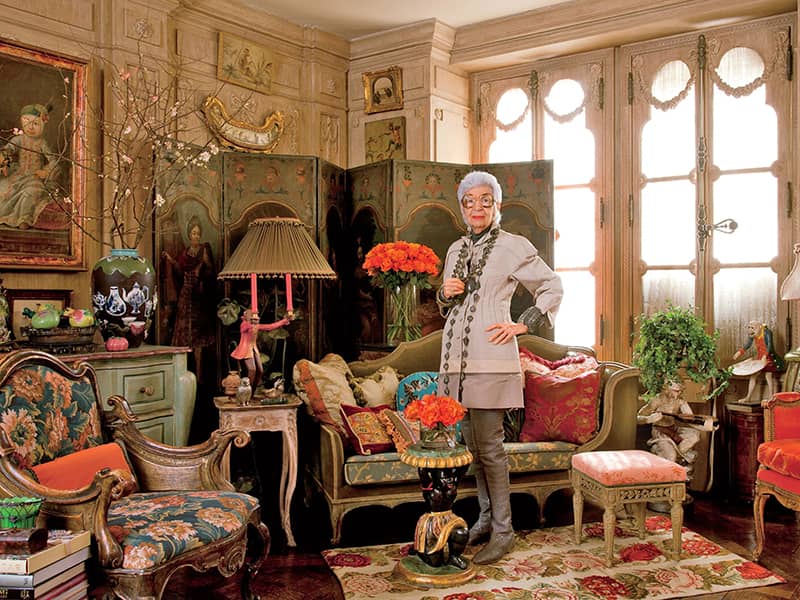
Staying relevant in a changing world
A big part of Apfel’s appeal was relevance. For anyone under the age of 50 who has tried to help an elderly member of their own family master the intricacies of a smartphone, one might gape in wonder at Apfel’s ability to not only grasp, but contribute to the modern media stage with such finesse and success. And while she may have be adept, Apfel was not entirely convinced by these 21st-century methods. “The biggest change I’ve seen? Speed! With fast fashion and technology, trends come and go before you can even blink. Back in my day, a style was savoured, not swapped. I think that’s a shame in one way because people mindlessly follow trends without stopping to think whether it suits them, and there is nothing worse than looking in the mirror and not recognising the person staring back at you!” she shared.
“On the other hand, the world is more connected than ever, and so is fashion. Now, a designer from Mumbai can inspire a stylist in New York overnight, and that is wonderful. For me, it’s about the same thing it always has been: is it authentic? If not, you’re wasting your time.”
Her husband Carl passed away in 2015, three days before his 101st birthday, and after 67 blissful years of marriage. Naturally, Apfel expressed deep sadness at her loss.
“Carl and I had the utmost respect for one another and that’s really the key to why it worked so well. It may sound surprising, but we did adhere to those traditional roles where he was strong and masculine, and I was very feminine. The main thing though was that we both had freedom to pursue our own endeavours and that’s why I persist now after he has gone. I mean, I still feel this deep loss, but he would have wanted me to keep working because he knew that was my passion,” she explained. Despite her increasing age, Apfel retained a hunger for travel that has long been an essential part of her lifestyle. Like most travellers over 80 she was enticed by the promise of cruise ships, saying: “Why pack light and fly when you can voyage by sea and take all your favourite clothes?
“Travel has always given me inspiration, and restores my faith in the human spirit. Africa takes my breath away because it is probably the place on Earth that, to me, represents so much of who we all are. The energy, the struggle, the space and the confines of existence.”
She also remained fascinated by other indigenous cultures, marrying this with a juxtaposed love of everything cutting edge. It makes sense – Apfel’s stock-and-trade was always in recreating the beauty of the past in the present. We can only imagine what this powerhouse of a woman would have achieved had she had been born in the internet age.
Yet wondering does no-one any good, and that’s why Iris Apfel remained such a unique and formidable force.
“You have to be interested,” she summarised. “If you’re not interested, you cannot be interesting. Period.”
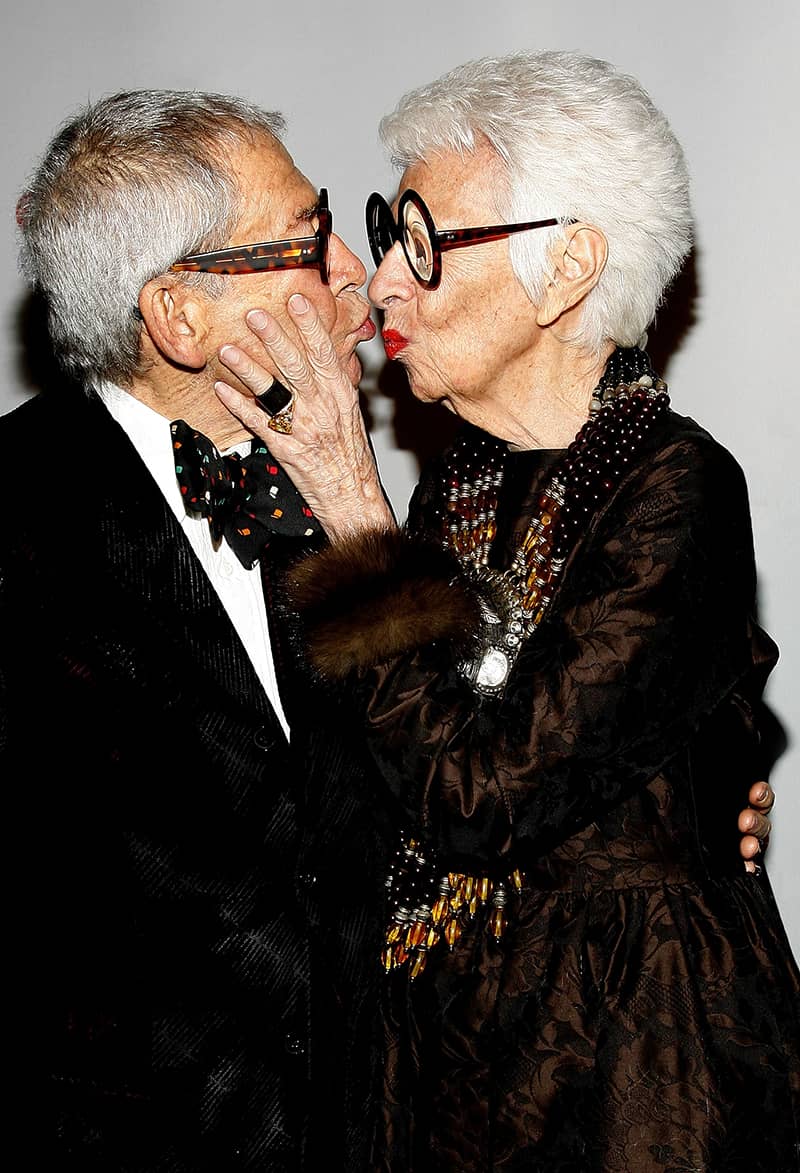
Humour & respect
Iris Apfel is pictured with her late husband Carl Apfel at the 2008 Lighthouse International Light Years Gala in New York City. Married for six decades, she met Carl in 1947, while they both were vacationing in Lake George, New York, and got engaged the same year. Asked about the secret of her “beautiful” marriage, she told Hello! magazine: “We had mutual understanding. But a sense of humour played a big part.” She also mentioned giving one another enough space: “I didn’t expect him to love all of my friends, and he didn’t love all my friends – which was probably okay. We didn’t have to do things together all the time.” Carl was also a big supporter of her career as well as her status as a style icon.
Photography: Roger Davies / John Huba / Art + Commerce / Raven & Snow


